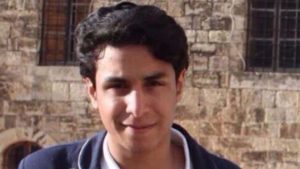YEMEN: A MAN AT RISK OF IMMINENT EXECUTION
source: Amensty Int UA 23/13 AI
Index: MDE 31/001/2013 of 30 January 2013
Muhammad Abdul Wahhab Faysal al-Qassem is at imminent risk of execution after the President of Yemen ratified his death sentence. His age at the time of his alleged crime remains in dispute. He could be executed at any time in the next two weeks.
Muhammad
Abdul Wahhab Faysal al-Qassem was sentenced to death on 14 February 2005 by the
Court of First Instance in Ibb, 190 kilometres south of capital Sana’a. He was
convicted of a murder he was alleged to have committed in February 1998. His
death sentence was upheld by an appeal court in February 2009 and was confirmed
by the Supreme Court in February 2012. It was recently ratified by the
President of Yemen. He is being held in Ibb prison.
Muhammad
Abdul Wahhab Faysal al-Qassem told Amnesty International that members of the
General Prosecution visited him in prison this week and told him that the
President has ratified his death sentence. He was also told that he had two
weeks left to see his family, write a will, and seek a pardon from the family
of the victim.
He
maintains that he was under 18 years old at the time of the alleged offence.
According to him, the court had determined that he was over 18 on the basis of
falsified copies of his school reports and a medical examination in 2004 that
Muhammad Abdul Wahhab Faysal al-Qassem says did not actually occur. The court
judged that the copies of the birth certificate that he presented were forged.
Please write immediately.
*
Call on the President of Yemen to halt the execution of Muhammad Abdul Wahhab
Faysal al-Qassem.
*
Ask them to commute the death sentence of Muhammad Abdul Wahhab Faysal
al-Qassem, as well as those of all other prisoners under death sentence.
*
Remind them that they are bound by international standards for fair trial in
capital cases, including the right to be presumed to be under the age of
majority when in doubt and the right to seek pardon or commutation of the
sentence.
*
Urge the President to stop ratifying death sentences and establish a moratorium
on executions, with a view to completely abolishing the death penalty.
Here is the contact information you
need:
His
Excellency Abd Rabbu Mansour al-Hadi
Office
of the President
Sana’a,
Republic of Yemen
Fax:
011 967 1 274 147 (hard to
reach)
Salutation:
Your Excellency
Attorney General:
His
Excellency Ali Ahmed Nasser al-Awash
Attorney
General’s Office
Sana’a,
Republic of Yemen
Fax:
011 967 1 374 412 (hard to reach)
Salutation:
Your Excellency
Please send a copy
to
His Excellency Khaled Mahfoudh Abdullah Bahah
Ambassador for Yemen
54 Chamberlain Avenue
Ottawa, Ontario K1S 1V9
Fax: (613)
729-8915
Minister of Human Rights:
Her
Excellency Houriah Ahmed Mashhour
Ministry
for Human Rights
Sana’a,
Republic of Yemen
Fax:
011 967 1 444 833 (hard to
reach)
Email:
mshr@y.net.ye
Salutation:
Your Excellency
Additional Information
Amnesty
International has long-standing concerns about the use of the death penalty in
Yemen, particularly as death sentences are often passed after proceedings which
fall short of fair trial. In 2012, a large number of offenders were sentenced
to death and dozens were executed.
Yemen
has made significant progress in the prohibition of the use of the death
penalty against juvenile offenders (those convicted of crimes committed when
they were under 18 years of age). It ratified the Convention on the Rights of
the Child in 1991. At the time, the prohibition of the use of the death penalty
against juveniles was limited to offenders below the age of 15 at the time of
the crime. However, this was extended in 1994 to include individuals below the
age of 18 at the time of the commission of capital offences. This was
stipulated in Article 31 of the Penal Code, Law 12 of 1994, and marked progress
to bringing Yemen’s laws into line with both Article 37 of the Convention on
the Rights of the Child and Article 6 of the International Covenant on Civil
and Political Rights, to which Yemen is also a state party. Both treaties
categorically prohibit the use of the death penalty against anyone under 18
years of age at the time of commission of any crime.
However,
some courts in Yemen continue to impose the death penalty for alleged offenders
who may have been below the age of 18 at the time of the offence. Amnesty
International is aware of at least 26 people who are possible juvenile
offenders under sentence of death in Yemen and 200 such individuals who are at
risk of being sentenced to death.
In
a large number of areas of Yemen, birth certificates are not issued or sought
by families, creating confusion around the date of birth of alleged young
offenders. Prosecutors typically hire medical examiners who in many cases have
been accused of drawing biased conclusions that support the prosecution’s view
on the age of the defendant.
An
official medical examination committee was formed in 2012 to determine the age
of alleged juvenile offenders, especially in cases where birth certificates are
unavailable. The medical committee, which has been supported and funded by the
UNICEF and the European Commission, has so far been unable to carry out
effective work, due to a lack of appropriate legislation or definition of its
status. It was not involved in the case of Muhammad Abdul Wahhab Faysal
al-Qassem.
Amnesty
International believes that governments should apply a full range of
appropriate criteria in cases where there is dispute over whether an alleged
offender was over or under 18 years of age at the time of the offence. Good
practice in assessing age includes drawing on knowledge of physical,
psychological and social development. Each of these criteria should be applied
in a way that gives the benefit of doubt in disputed cases so that the
individual is treated as a juvenile offender and accordingly that the death
penalty is not applied. Such an approach is consistent with the principle that
the best interests of the child shall be a primary consideration in all actions
concerning children, as required by Article 3(1) the Convention on the Rights
of the Child.
The
Human Rights Council on 23 March 2012 adopted resolution 19/37 on Rights of the
Child, in which it urged States, “to presume children alleged as, accused of or
recognized as having infringed the criminal law to be under the age of majority
when their age is in doubt until such an assumption is rebutted by the
prosecution, and to treat the accused as a juvenile if the burden is not met.”
Amnesty
International acknowledges the right and responsibility of governments to bring
to justice those suspected of recognizably criminal offences, but is
unconditionally opposed to the death penalty in all cases as the ultimate
cruel, inhuman or degrading punishment, and as a violation of the right to
life.



